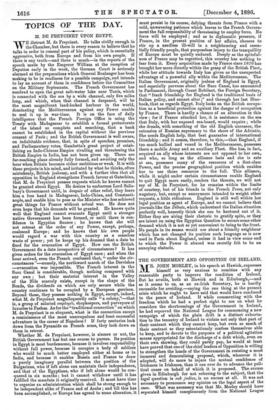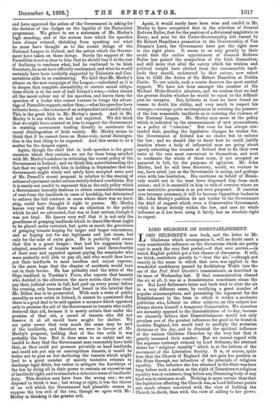THE GOVERNMENT AND OPPOSITION ON IRELAND.
MR. JOHN MORLEY, in his speech at Hawick, expresses himself as very anxious to combine with any reasonable party to improve the condition of Ireland. But he avoids, both at Hawick and in Edinburgh,—and as it seems to us, as an ex-Irish Secretary, he is hardly excusable for avoiding,—saying the one thing at the present crisis which he ought to have said that would have conduced to the peace of Ireland. If while commenting with the freedom which he had a perfect right to use on what he considers the shortcomings of the Government in Ireland, he had reproved the National League for commencing a new campaign of which the plain drift is a distinct exhorta- tion to the tenantry of Ireland to violate not only that part of their contract which they cannot keep, but even so much of their contract as they ostentatiously confess themselves able to keep, and to devote to the purposes of a political agitation means appropriated for the discharge of a debt which, even on their own showing, they could partly pay, he would at least have proved that one of the chief leaders of Opposition is willing to strengthen the hands of the Government in resisting a most immoral and demoralising proposal, which, wherever it is adopted, will do more to injure the mutual confidence of Irishmen in Irishmen, than it can ever do to advance the poli- tical cause on behalf of which it is proposed. The excuse given in Edinburgh for not referring to the subject, that the legal question is sub judice, is no excuse at all. It was not necessary to pronounce any opinion on the legal aspect of the case. What was necessary was that Mr. Morley should have separated himself conspicuously from the National League
and have approved the action of the Government in asking for the decision of the Judges on the legality of the Nationalist programme. We grieve to see a statesman of Mr. Morley's high standing, and of the serious tone which his speeches have always evinced, shrinking from speaking out what he must have thought as to the recent doings of the National League in Ireland, and the action which the Govern- ment have taken on those doings. Surely the support of the Parnellites is not so dear to him that he should buy it at the cost of declining to condemn what, had he continued to be Irish Secretary, he must have officially condemned, and what he would certainly have been cordially supported by Unionists and Con- servatives alike in so condemning. We hold that Mr. Morley's silence on the new campaign of the League,—calculated as it is to deepen that complete insensibility to certain moral obliga- tions which is at the root of half Ireland's woes,—takes almost all the moral colour out of his speeches, and leaves them the speeches of a leader who cannot venture to forego the advan- tage of Parnellite support, rather than,—what his speeches have hitherto been,—the outcome of an independent and candid mind. This is the great blot in Mr. Morley's speech. And in Mr. Morley it is one which we had not expected. We did think that we might have counted on him to support the Government in resisting movements tending directly to accelerate the moral disintegration of Irish society. Mr. Morley seems to think that if he cannot force on Home-rule, moral disintegra- tion is the best thing to be expected. And this seems to us a matter for the deepest regret.
Again, though the chief blot in both speeches is the great omission which they contain, we are far from being satisfied with Mr. Morley's candour in criticising the recent policy of the Government in Ireland ; and we think this, notwithstanding the fact that we agreed with him in holding in September that the Government might wisely and safely have accepted some part of Mr. Parnell's recent proposal in relation to the staying of actions of ejectment under certain strictly defined conditions. But it is surely not candid to represent this as the only policy which a Government honestly desirous to obtain reasonable remissions of rent from the landlords in cases of hardship, but determined to enforce the full contract in cases where there was no hard- ship, could have thought it right to pursue. Mr. Morley knows very well that there was an objection to the policy which he and we advocated, that was at least serious, though it was not fatal. He knows very well that it is not only the greediness of grasping landlords which in times like these ought to be placed under restraint, but quite as much the greediness of grasping tenants hoping for larger and larger concessions, and so hoping not for any legitimate and just cause, but only for the sake of extra gain. He is perfectly well aware that this is a great danger ; that had his suggestion been adopted, numbers of tenants would have paid three-fourths of their rent and appealed against paying the remainder who were perfectly well able to pay all, and who would thus have put their landlords to most needless and unjust expense, in the mere hope that the chapter of accidents would turn out in their favour. He has probably read the letter of the Sligo landlord, in Tuesday's Times, who reports that tenants who derided in the afternoon the mere notion that they could pay their judicial rents in full, had paid up every penny before the evening, only because they had heard in the interval that Mr. Dillon was to be prosecuted. With such a state of public morality as now exists in Ireland, it cannot be questioned that there is a good deal to be said against a measure which appeared only to promise the aid of the Government to tenants who really deserved that aid, because it is nearly certain that under the promise of that aid, a crowd of tenants who did not deserve it at all would have sought for shelter. We are quite aware that very much the same may be said of the landlords, and therefore we were in favour of Mr.
Morley's proposal, holding that of the two evils it was probably the less. But it does seem to us unfair and un- candid to deny that the Government may reasonably have held that, as they could put pressure privately on hard landlords, and could not put any on unscrupulous tenants, it would be better not to pass an Act sheltering the tenants which might lead to a great number of merely tentative refusals to discharge legal debts, but rather to mitigate the hardships of the law by doing all in their power to restrain an excessive use of landlords' right, and to stimulate a defective sense of landlords' duty. This decision may have been the wrong one ; we are disposed to think it was ; but wrong or right, it was the choice of an evil which the Government had plausible reason to suppose the less evil of the two, though we agree with Mr. Morley in thinking it the greater evil. Again, it would surely have been wise and candid in Mr. Morley to have recognised that in the selection of General Redvers Buller, first for the position of a divisional magistrate in Kerry, and next for the Under-Secretaryship left vacant by Sir Robert Hamilton s promotion to the Governorship of Van Diemen's Land, the Government have put the right man in the right place. It seems to us very greatly to their credit that the earlier appointment of General Redvers Buller has gained the sympathies of the Irish themselves, and still more that after the outcry which his wisdom and political insight have elicited from the unreasonable land- lords they should, undeterred by that outcry, now select him to fulfil the duties of Sir Robert Hamilton at Dublin Castle. To our minds, such a course deserves the most cordial support. We have not been amongst the number of Sir Michael Hicks-Beach's admirers, and we confess that we had the gravest doubts whether he would be equal to the difficult post he occupies. But, hitherto at least we have found no reason to doubt his ability, and very much to respect his courage,—courage quite as conspicuous in resisting the pressure of the less reasonable landlords as in resisting the violence of the National League. Mr. Morley may sneer at the policy which is indicated by the announcement of new prosecutions, as a policy of "coercion." But even he has always con- tended that, pending the legislative changes ho wishes for, the Government of Ireland has no choice but to enforce the law ; and we should like to know how he could justify inaction where a body of influential men are going about openly exhorting the tenants of Ireland first to fix their own rents at the rate most convenient to themselves, and next to confiscate the whole of those rents, if not accepted as payment in full, for the purposes of agitation. Mr. John Morley, had he still been Secretary, would, we venture to say, have acted just as the Government is acting, and perhaps even with less hesitation. His exertions on behalf of Home- rule would not in the least have dispensed him from such action; and it is uncandid in him to talk of coercion where no new restrictive provision is as yet even proposed. If coercion ever becomes necessary, it will be because Opposition leaders in Mr. John Morley's position do not tender to the Government the kind of support which even a Conservative Government, while it keeps strictly within the law, and uses its whole influence as it has been using it lately, has an absolute right to expect.







































 Previous page
Previous page